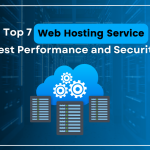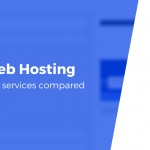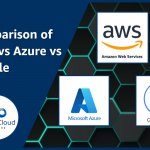
In today’s digital age, having an online presence is crucial for businesses, bloggers, and individuals alike. However, choosing the right web hosting plan can be a daunting task, especially with the wide array of options available in the market. The right hosting plan can ensure that your website runs smoothly, loads quickly, and is accessible to your target audience. On the other hand, a poorly chosen plan can lead to frustrating downtimes, slow loading speeds, and a subpar user experience. In this article, we’ll explore the factors to consider when selecting the best web hosting plan for your needs.
TYPES OF WEB HOSTING
SHARED HOSTING Shared hosting is the most affordable and popular option for individuals and small businesses with modest traffic volumes. In this type of hosting, multiple websites share the resources of a single server, making it a cost-effective solution. However, it’s important to note that the performance of your website can be affected by the resource usage of other sites on the same server.
VIRTUAL PRIVATE SERVER (VPS) HOSTING VPS hosting is a step up from shared hosting, offering more resources and better performance. With VPS hosting, your website is hosted on a virtual machine that allocates dedicated resources, such as RAM and CPU, within a larger physical server. This provides more control, security, and flexibility compared to shared hosting.
DEDICATED SERVER HOSTING Dedicated server hosting is the most powerful and expensive option, where you have a entire physical server dedicated to your website or application. This type of hosting offers unparalleled performance, security, and customization options, making it ideal for high-traffic websites, resource-intensive applications, and businesses with stringent security requirements.
CLOUD HOSTING Cloud hosting is a relatively new and rapidly growing hosting solution that leverages the power of cloud computing. Instead of relying on a single physical server, your website is hosted across a network of virtual servers, providing scalability, redundancy, and high availability. Cloud hosting is an excellent choice for websites with fluctuating traffic or those requiring seamless scalability.
FACTORS TO CONSIDER WHEN CHOOSING A WEB HOSTING PLAN
WEBSITE TYPE AND REQUIREMENTS The type of website you plan to host plays a significant role in determining the appropriate hosting plan. A simple informational website with minimal traffic can be hosted on a shared hosting plan, while an e-commerce site or a resource-intensive application may require a more robust solution like VPS or dedicated server hosting.
TRAFFIC VOLUME AND GROWTH POTENTIAL It’s crucial to consider the expected traffic volume and potential growth when selecting a hosting plan. If you anticipate a significant increase in traffic over time, it’s advisable to choose a scalable solution like cloud hosting or a hosting plan that allows easy upgrades to avoid performance issues or downtime.
PERFORMANCE AND SPEED Website performance and speed are critical factors that can significantly impact user experience and search engine rankings. Factors like server resources, caching mechanisms, and content delivery networks (CDNs) can influence website speed. Evaluate the performance capabilities of different hosting plans to ensure your website loads quickly and efficiently.
SECURITY AND RELIABILITY Ensuring the security and reliability of your website should be a top priority, especially if you handle sensitive data or run an e-commerce platform. Look for hosting providers that offer robust security features, such as SSL/TLS encryption, firewalls, and regular backups, as well as reliable uptime guarantees and redundancy measures.
TECHNICAL SUPPORT AND CUSTOMER SERVICE When choosing a web hosting provider, consider the quality of their technical support and customer service. A responsive and knowledgeable support team can be invaluable in addressing any issues or challenges that may arise, ensuring minimal downtime and a smooth user experience.
SCALABILITY AND FUTURE GROWTH As your website grows and evolves, your hosting needs may change. Consider hosting plans that offer scalability options, allowing you to easily upgrade or downgrade resources as needed. Cloud hosting and managed hosting solutions often provide seamless scalability, making them suitable for businesses with ambitious growth plans.
CONTROL AND CUSTOMIZATION Depending on your technical expertise and requirements, you may need a hosting plan that offers more control and customization options. Dedicated server hosting and certain VPS plans provide root access and the ability to install custom software, making them ideal for developers or those with advanced technical needs.
COST AND BUDGETARY CONSIDERATIONS While cost should not be the sole determining factor, it’s essential to consider your budget when choosing a web hosting plan. Shared hosting plans are typically the most affordable, while dedicated server hosting and managed hosting solutions can be more expensive. Evaluate the features and resources offered by each plan to ensure you’re getting the best value for your investment.
PROVIDER REPUTATION AND REVIEWS Before committing to a web hosting provider, research their reputation and read customer reviews. Look for providers with a proven track record of reliability, performance, and excellent customer service. Additionally, consider factors like the provider’s longevity in the market, data center locations, and compliance with industry standards.
MAKING THE FINAL DECISION
Once you’ve evaluated the various factors and hosting options, it’s time to make the final decision. Here’s a general guideline to help you choose the best web hosting plan for your needs:
- Simple Websites and Blogs: If you’re creating a basic website or blog with minimal traffic, a shared hosting plan from a reputable provider should suffice.
- Small to Medium Websites and Businesses: For small to medium-sized businesses or websites with moderate traffic, consider a VPS hosting plan or a higher-tier shared hosting plan with more resources.
- High-Traffic Websites and Resource-Intensive Applications: For websites with significant traffic volumes, e-commerce platforms, or resource-intensive applications, a dedicated server or cloud hosting solution may be the best choice.
- Rapidly Growing Businesses and Websites: If you anticipate rapid growth or fluctuating traffic patterns, cloud hosting or managed hosting solutions with scalability options can be an excellent investment.
- Businesses with Stringent Security and Compliance Requirements: For businesses operating in highly regulated industries or handling sensitive data, dedicated server hosting or cloud hosting from a provider with robust security and compliance certifications may be the most appropriate option.
Remember, your hosting needs may change over time, so it’s crucial to choose a provider that offers flexibility and the ability to upgrade or downgrade your plan as needed. Additionally, don’t hesitate to seek advice from web hosting professionals or consult with your website developer to ensure you make an informed decision that aligns with your specific requirements.
CONCLUSION
Choosing the best web hosting plan for your needs is a critical decision that can significantly impact your website’s performance, security, and overall user experience. By considering factors such as website type, traffic volume, performance requirements, security, scalability, and budget, you can narrow down your options and select a hosting plan that meets your current and future needs.
Remember, investing in a reliable and reputable web hosting provider can save you from frustrating downtimes, slow loading speeds, and potential security breaches, ultimately contributing to the success of your online presence.
Take the time to research and compare different hosting providers and plans, read customer reviews, and seek advice from experts if needed. With the right web hosting plan in place, you can ensure a smooth and efficient online experience for your visitors, paving the way for growth and success in the digital landscape.















![How To Migrate WordPress Site To New Host Or Server? [Free]](https://webhostingtechy.com/wp-content/uploads/2024/03/migrate-wordpress-site-74x55.png)